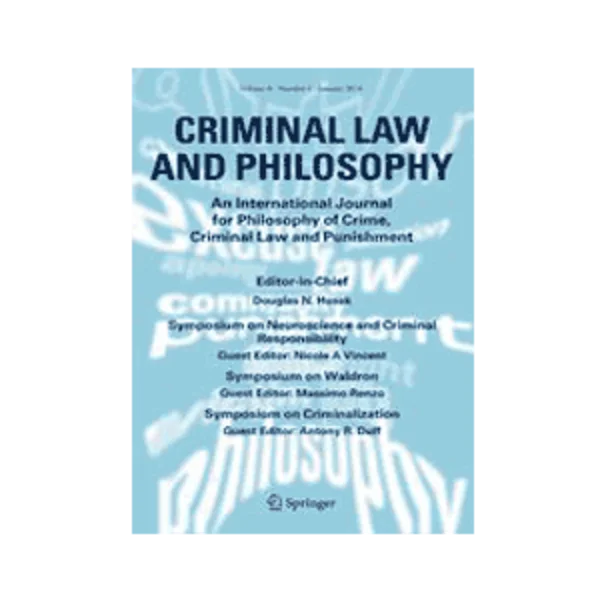-
legal vices and civic virtue: vice crimes, republicanism and the corruption of lawfulness
جزئیات بیشتر مقاله- تاریخ ارائه: 1392/07/24
- تاریخ انتشار در تی پی بین: 1392/07/24
- تعداد بازدید: 1163
- تعداد پرسش و پاسخ ها: 0
- شماره تماس دبیرخانه رویداد: -
vice crimes, crimes prohibited in part because they are viewed as morally corrupting, engage legal theorists because they reveal importantly contrasting views between liberals and virtue-centered theorists on the very limits of legitimate state action. yet advocates and opponents alike focus on the role law can play in suppressing personal vice; the role of law is seen as suppressing licentiousness, sloth, greed etc. the most powerful advocates of the position that the law must nurture good character often draw on aristotelian theories of virtue to ground the connection between law and virtue. while aristotle believed that law and character were linked, it is ironic to note that he did not argue for the position evidenced in our vice laws that law was likely to succeed in instilling virtue. indeed, aristotle thought the project of using law to instill private virtue was nearly certain to fail. aristotle’s deep concern was not for the way law protected private virtue within each person but the way law had to protect civic virtue between citizens. this article argues that even from its foundations, the project of vice crimes as moral instruction is misconceived. the use of law for overly instrumental or narrow reasons opens law and legal institutions to abuse and factionalism. lawyers, judges and others specially connected to law must first and foremost aim at addressing “legal vices,” vices internal to the institutions of law. particularly, increasing factionalism and instrumentalism which disconnects law from the pursuit of the common good threatens our civic bonds. most importantly, where civic bonds are disrupted, citizens have no reason to remain law abiding. the striking lesson, captured both in ancient philosophy and modern history, is that when legal vices grow unchecked and factions use the law to pursue narrow interests, ultimately law abidingness is corrupted and interest groups harm themselves as much as others.
مقالات جدیدترین رویدادها
-
استفاده از تحلیل اهمیت-عملکرد در ارائه الگوی مدیریت خلاقیت سازمانی و ارائه راهکار جهت بهبود
-
بررسی تاثیر ارزش وجوه نقد مازاد بر ساختار سرمایه شرکت های پذیرفته شده در بورس اوراق بهادار تهران
-
بررسی تأثیر سطح افشای ریسک بر قرارداد بدهی شرکت های پذیرفته شده در بورس اوراق بهادار تهران
-
بررسی تأثیر رتبه بندی اعتباری مبتنی بر مدل امتیاز بازار نوظهور بر نقد شوندگی سهام با تأکید بر خصوصی سازی شرکت ها
-
تأثیر آمیخته بازاریابی پوشاک ایرانی بر تصویر ذهنی مشتری پوشاک ایرانی (هاکوپیان)
-
جایگاه سقف های گنبدی در ایجاد محیط آسایش
-
ارزیابی عملکرد سیستم ترکیبی دیاگرید در سازه های بلندمرتبه
-
تبیین مفهوم عملکرد کسب و کار: مطالعه مروری
-
ارزیابی شیر تولیدی در اولین دوره شیردهی گاوهای هلشتاین ایران در استان های مختلف کشور
-
چالش های سلطه ی زبان انگلیسی برای زبان فصیح عربی در عصر جهانی شدن
مقالات جدیدترین ژورنال ها
-
مدیریت و بررسی افسردگی دانش آموزان دختر مقطع متوسطه دوم در دروان کرونا در شهرستان دزفول
-
مدیریت و بررسی خرد سیاسی در اندیشه ی فردوسی در ادب ایران
-
واکاوی و مدیریت توصیفی قلمدان(جاکلیدی)ضریح در موزه آستان قدس رضوی
-
بررسی تاثیر خلاقیت، دانش و انگیزه کارکنان بر پیشنهادات نوآورانه کارکنان ( مورد مطالعه: هتل های 3 و 4 ستاره استان کرمان)
-
بررسی تاثیر کیفیت سیستم های اطلاعاتی بر تصمیم گیری موفق در شرکتهای تولیدی استان اصفهان (مورد مطالعه: مدیران شرکتهای تولیدی استان اصفهان)
-
تبیین و طراحی الگوی پیاده سازی مدیریت دانش در شرکت های تولیدی استان گیلان
-
تأثیر حمل و نقل چند وجهی در افزایش بهره وری و کاهش هزینه حمل کالاها در بندر امام خمینی
-
آموزش دهی و یادگیری (آموزشی محور ها) به عنوان جایگزین های حبس
-
وضعیت حقوقی انتقال اعتبارات اسنادی تجاری و تضمینی؛ مطالعه تطبیقی نظام حقوقی ایران، امریکا و اسناد حقوقی بین المللی
-
بازشناسی تحلیلی نقش مربع در شکل گیری فضاهای معماری ایران در دوره صفویه




سوال خود را در مورد این مقاله مطرح نمایید :